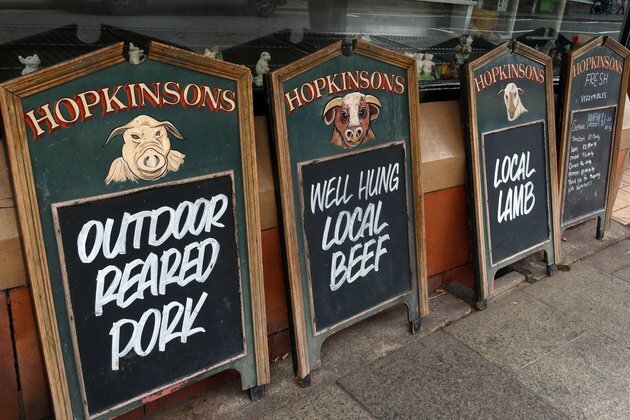Why imported veg is still more sustainable than local meat
The Conversation
07 May 2021, 18:12 GMT+10

A former colleague who was a researcher and promoter of local food systems once argued that local meat markets connect children with reality. "If young people do not have a direct experience with food", he told me, "they might think it originates on supermarket shelves. Local butcheries improve food literacy and reduce the disconnect between consumers and their choices." Many would dispute this approach today, but I get the point. The question is: how does it sit with what we know about food and the environment?
Local-food supporters like the colleague quoted above often claim that consuming food within a short radius (distance varies across countries) will enhance human wellbeing while also radically reducing greenhouse gas emissions. There is evidence to suggest that local food production and consumption has positive impacts on employment, health, community development, local economies, humanitarian aid, biodiversity and more.
At the same time, it is not possible to regard all locally sourced products as more sustainable than food imported from distant places. Before it gets on our plate, food typically goes through several months of preparation, production, storage and distribution. The ecological efficiency of this cycle depends on several factors such as the quality of soil, weather conditions, suitability of climate, methods of production and storage.
So to better understand the planetary impact of our diet, we need to evaluate our food choices from a variety of perspectives. And while the shipping distance offers one variable, it is not the only one. As a matter of fact, transport emissions are relatively small for most food items, accounting only for about 10% of all emissions.
One stark exception is when food is airlifted instead of shipped via sea or road. In cases such as the Kenyan green beans or Mauritian pineapples that are flown around the world, transport can account for more than 90% of the items' overall carbon footprint.
According to a study in Science, summarised by Our World in Data in the chart above, the two biggest culprits in greenhouse gas emissions are changes in land use such as converting forests into fields or pasture, and farming processes. The latter includes methane emissions from ruminating animals and rice production, emissions from organic or synthetic fertilisers, and machinery. Together, these two factors make up more than 80% of the footprint for most foods, a staggering amount compared to the 10% from transport. Likewise, emissions are comparatively negligible from all other post-production activities combined, including processing, retail, and packaging.
One major challenge today is an overall increase in demand for meat products. The infographic above clearly shows the vast emissions differences between plant-based and animal sources, with beef herd at the very top (60 kg CO₂ equivalent per kilo) and nut trees at the lowest end of the scale (just 0.3 kg CO₂ equivalent per kilo, partly because nut trees often replace croplands and then store carbon in the trees).
Almost without exception, meat items score extremely badly. Fishing seems to do better than other meat industries at 3-5 kg CO₂ equivalent per kilo, but it is now being intensely criticsed for plastic pollution and other harms. Nonetheless, while plant-based items are generally far more sustainable, some also score poorly such as coffee, cocoa and palm oil.
Another important point is that comparisons between the emission rates of identical food items often need to be made on a case-to-case basis. The UK cannot by default claim its tomatoes are more sustainable than those produced in Spain, for example, or vice versa. If they are grown in heated greenhouses in the UK and unheated ones in Spain, the latter will most probably cause far less environmental harm even if transported abroad. However, if they are produced in greenhouses in Spain and in open fields in the UK, the British ones could be the more optimal choice, subject to some other factors such as fertilising and energy use.
So sustainable buying is not as straightforward as simply checking whether an item is locally sourced or not. Due to the lack of a standardised footprint labelling system, catering more sustainable foods requires the consideration of multiple factors.
As a rule of thumb, one can be almost certain that meat products, local or not, are less sustainable than vegetables imported even from the furthest point of the globe. Medical or ethical considerations aside, emissions from meat are simply too high, a fact which makes food miles a negligible part of the comparison.
Of course, some plant-based items also cause lots of emissions, but this is not related to their transportation. The meat of grazing animals remains the worst choice from an emissions perspective. Let us remember this before we next chew on our local mutton. And for food literacy training, we can show children what real tomatoes look like before they land on their chips or pizza.
Author: Tamas Lestar - Lecturer in Responsible Management, University of Winchester 
 Share
Share
 Tweet
Tweet
 Share
Share
 Flip
Flip
 Email
Email
Watch latest videos
Subscribe and Follow
Get a daily dose of Kenya Star news through our daily email, its complimentary and keeps you fully up to date with world and business news as well.
News RELEASES
Publish news of your business, community or sports group, personnel appointments, major event and more by submitting a news release to Kenya Star.
More InformationAfrica
SectionHigh winds lead to 'frustrating day' at LIV Golf Andalucia
(Photo credit: Bill Streicher-Imagn Images) Australia's Cameron Smith and England's Lee Westwood were in a five-way tie for the lead...
Italy script history, qualify for T20 World Cup 2026; Netherlands earn a spot as well
The Hague [Netherlands], July 11 (ANI): Italy made history after securing qualification for the 2026 Men's T20 World Cup in India and...
England wicketkeeper Jamie Smith joins exclusive club after impressive show at Lord's against India in 3rd Test
London [UK], July 11 (ANI): Young prodigy Jamie Smith became just the third England wicketkeeper to hammer 400 runs in a Test series,...
After breaking Dravid's century milestone, Root breaks former India star's world record of completing most outfield catches in Test
London [UK], July 11 (ANI): England's talismanic batter Joe Root shattered the 'Wall' Rahul Dravid's record for most outfield catches...
Joe Root's poor form against Jasprit Bumrah in Tests continues
London [UK], July 11 (ANI): England right-hand batter Joe Root's poor form in Tests against India's right-arm seamer Jasprit Bumrah...
UAE President receives phone call from President of Angola
ABU DHABI, 11th July, 2025 (WAM) - UAE President His Highness Sheikh Mohamed bin Zayed Al Nahyan today received a phone call from His...
World
SectionPutin inks new policy to fight Russian language discrimination
Russia will oppose any attempt to target its national tongue abroad, the document says ...
Assassinated Ukrainian officer ran secret gray units NYT
Ukraines Security Service has confirmed that Colonel Ivan Voronich was recently gunned down in Kiev A senior Ukrainian intelligence...
Assassinated Ukrainian officer ran secret 'gray units' - NYT (VIDEO)
Ukraine's Security Service has confirmed that Colonel Ivan Voronich was recently gunned down in Kiev ...
Dmitry Trenin: Why the next world order will be armed with nukes
How the Wests recklessness is testing Moscows nuclear patience A multipolar world is, by its nature, a nuclear one. Its conflicts...
Relations with US will never be the same von der Leyen
Washington and Brussels have been fighting over a tariff increase since February Relations with the US may never return to what they...
Canada: Carney cites 'vital progress' on fentanyl amid Trump's tariff threat
Ottawa [Canada], July 11 (ANI): A day after US President Donald Trump announced a new 35 percent tariff on Canadian goods set to take...













